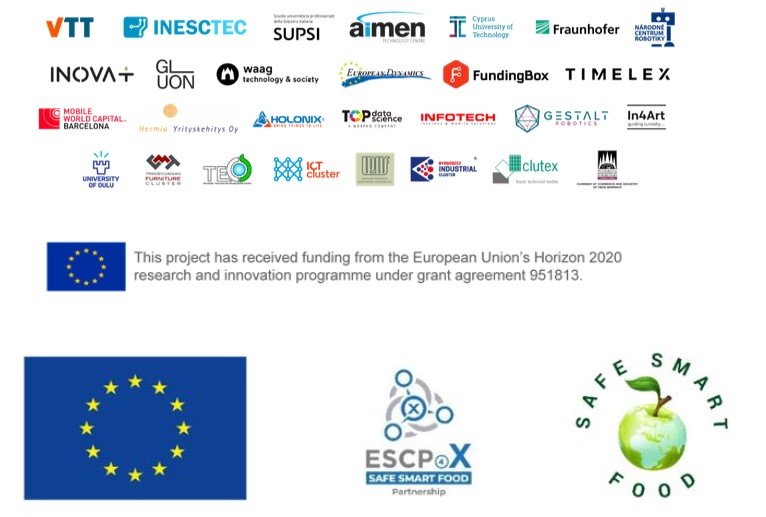Project SAFE SMART FOOD; grant agreement – 874389

European Strategic Cluster Partnership for Excellence (ESCP-4x)
Project SAFE SMART FOOD; grant agreement – 874389
The Safe Smart Food project’s kick off meeting in Austria to internationalise food related clusters in Europe
“Several European Clusters have gathered in Austria to present the Safe Smart Food project”
Austrian Food Cluster - Business Upper Austria organised the kick-off meeting of the new European Strategic Cluster Partnership for Excellence (ESCP-4x): Safe Smart Food. The meeting was held in Linz, Austria on March 2nd and 3rd.
The kick-off meeting started on the first day with the introduction of each partner who explained their activities, members, ongoing projects, initiatives and other links with Safe Smart Food project’s strategy.
During the meeting Laura Smith – Wood Cluster was presenting other cluster experiences such as Design Thinking for innovation in SMEs and Dorian Wessely – Cleantech Cluster was presenting bio-based solutions for wood, food, pharma and packaging industries.
On the second day, project work packages were discussed where partners were agreeing in more details on each responsibilities and outcomes on the delivery. It was agreed that:
- Steering Committee meetings will be organised some parts of the project deliverables as strategy.
- Sector studies will be outsourced.
- Within the project, the general skills together with specific skills will be used to elaborate the e-book where skills will be generated within 6 webinars.
- 2 study visits will be organised where each partner will need to involve at least 4 clusters
- A hackathon will be organised
- An exchange programme will be organised, throughout the program sustainability
- And communication and dissemination actions will be implemented.
The Safe Smart Food project
The Safe Smart Food project is composed by 5 clusters from 4 EU countries- Business Upper Austria from Austria, Smart Food Cluster from Lithuania, Food Products Quality Cluster from Latvia and Packaging Cluster and Food Service Cluster, both from Spain. These organizations have driven this project with the intention of promoting the internationalisation of the associated clusters and their member companies.
The aims of the project are to strengthen the collaboration between clusters and improve their management capacity to create the conditions of a favourable ecosystem in the agri-food sector to boost innovation, competitiveness and internationalisation of SMEs and to offer to the cluster’s SMEs an integrated program of services based on excellence.
This initiative provides for more than 50 exchanges between the different members of the European Clusters, which will improve the cluster tool individually and collectively. And it will offer a solution that guarantees healthy and quality food, with a package that takes care of the environmental impact it generates – eco-design – and optimizes resources, both at state and European level.
The needs of SMEs and the stakeholders involved will be analysed, as well as the final consumers, to offer services more aligned with the strategic trends of the sector, such as food security or lack of added value in the products in question. Subsequently, a 5-year strategy will be established to develop an implementation program of the improvements taken from the study, in line with the consortium’s strategy. The tools to reach it are: innovation, internationalisation, networking, sustainability and C2C conferences.
The total budget for the Safe Smart Food is 456,623 € with a contribution of 347,467 € by the European Union and 20 months to carry out the task.
More about the clusters involved:
Business Upper Austria main activities linked with the project’ strategy are: exchange of experience rounds, qualification seminars, trainings, funding consultancy where most of the funded projects are for packaging topics, support in internationalisation and fair tours, matchmaking and networking events.
Packaging Cluster has members from all the packaging value chain. Recently had the Gold Label audit, selected by the Catalan institution ACCIÓ. High level of participation in activities and projects from the cluster’ members. Sustainability and Shared Value working groups are target companies of the project. Annual reports analysing the sector, this year: Industry 4.0. Main activities linked with the project’s strategy are: strategic reflection events, technical and innovation seminars, inter-cluster workshops, internationalisation, training and spreading know-how, R+D+I projects.
Foodservice Cluster of Catalonia is a cluster organisation that is intended to promote and strengthen the competitiveness of the foodservice segment, initiatives aimed at driving the foodservice sector of Catalonia and stimulating and exploiting the synergies between the members of the value chain in order to drive the development of transforming projects. Projects and activities of great impact between cluster members with topics such as: user experience, km.0, digitalisation, food safety, eco/smart packaging, last mile.
Food Products Quality Cluster provides national food quality labels and improvement programmes for national food producers. Exportation is very important for the sector in the country. Members can offer green national products and flexible production to differentiate from big companies. Main activities linked with the project’s strategy are: R+D+I, internationalisation and collaborative projects.
Smart Food Cluster is a part of the European Cluster Alliance. Also, very focused on exportation due to the small size of the national market. Main activities linked with the project strategy are: business missions, B2B matchmakings, connection with packaging industry, digitalisation, new/smart products, internationalisation & growth.
----
This publication was funded by the European Union’s COSME Programme.
The content of this publication represents the views of the author only and is his/her sole responsibility; it cannot be considered to reflect the views of the European Commission and/or the Executive Agency for Small and Medium-sized Enterprises (EASME) or any other body of the European Union. The European Commission and the Agency do not accept any responsibility for use that may be made of the information it contains.
More information:
Contact details: Mònica Riera

